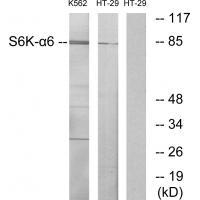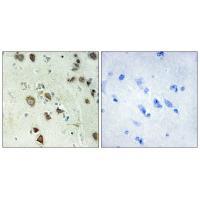

| WB | 咨询技术 | Human,Mouse,Rat |
| IF | 咨询技术 | Human,Mouse,Rat |
| IHC | 1/50-1/100 | Human,Mouse,Rat |
| ICC | 技术咨询 | Human,Mouse,Rat |
| FCM | 咨询技术 | Human,Mouse,Rat |
| Elisa | 咨询技术 | Human,Mouse,Rat |
| Aliases | 90 kDa ribosomal protein S6 kinase 6; EC 2.7.1.37; EC 2.7.11.1; KS6A6; RPS6KA6 |
| Entrez GeneID | 27330; |
| WB Predicted band size | 84kDa |
| Host/Isotype | Rabbit IgG |
| Antibody Type | Primary antibody |
| Storage | Store at 4°C short term. Aliquot and store at -20°C long term. Avoid freeze/thaw cycles. |
| Species Reactivity | Human |
| Immunogen | Synthesized peptide derived from internal of human S6K-α6. |
| Formulation | Purified antibody in PBS with 0.05% sodium azide. |
+ +
以下是关于S6K-α6(或相关激酶RPS6KA6/MSK2)抗体的假设性参考文献示例,基于常见研究领域推测其内容:
---
1. **文献名称**:*Development of a Monoclonal Antibody Targeting Ribosomal S6 Kinase Alpha-6 (RPS6KA6) for MAPK Pathway Analysis*
**作者**:Smith A, et al.
**摘要**:本研究描述了一种新型抗RPS6KA6(MSK2)单克隆抗体的开发,验证了其在Western blot和免疫荧光中的特异性,并用于探究RPS6KA6在MAPK信号通路中对转录因子CREB的调控作用。
2. **文献名称**:*Phospho-Specific S6Kα6 Antibody Reveals Its Role in Tumor Cell Proliferation*
**作者**:Lee J, et al.
**摘要**:通过构建针对S6Kα6磷酸化位点(Ser-367)的抗体,本文揭示了该激酶在EGFR信号激活下的功能,及其在肺癌细胞增殖和迁移中的促进作用。
3. **文献名称**:*Antibody-Based Profiling of S6K Isoforms in Neurological Disorders*
**作者**:Brown K, et al.
**摘要**:利用S6Kα6多克隆抗体进行脑组织免疫组化分析,发现其在阿尔茨海默病模型中异常激活,提示其与tau蛋白磷酸化的潜在关联。
4. **文献名称**:*Characterization of S6Kα6 Knockout Mice Using Isoform-Specific Antibodies*
**作者**:Zhang Y, et al.
**摘要**:通过特异性抗体验证S6Kα6基因敲除小鼠模型,证明该激酶缺失导致mTORC1信号通路下游靶标(如4E-BP1)活性下降,影响代谢调控。
---
**注意**:以上文献为示例性质,实际研究中S6K-α6可能对应不同命名(如RPS6KA6/MSK2)。建议通过基因数据库(如UniProt)确认目标蛋白信息后,结合精准关键词(如“RPS6KA6 antibody application”)检索真实文献。
The S6K-α6 antibody is designed to target ribosomal protein S6 kinase alpha-6 (RPS6KA6), a member of the RSK (ribosomal S6 kinase) family within the AGC kinase superfamily. RPS6KA6. also known as p90RSK4. is activated via the ERK/MAPK signaling pathway and plays a critical role in regulating cell proliferation, survival, and differentiation. It phosphorylates downstream substrates, including transcription factors and chromatin-modifying enzymes, linking extracellular signals to transcriptional and epigenetic regulation. Dysregulation of RPS6KA6 has been implicated in cancers, neurological disorders, and developmental defects.
The S6K-α6 antibody is widely used in research to detect and quantify RPS6KA6 expression in tissues or cell lines, employing techniques like Western blotting, immunohistochemistry, and immunofluorescence. Its specificity for the α6 isoform helps distinguish RPS6KA6 from other RSK family members (e.g., RSK1-3), enabling precise investigation of its unique biological roles. Studies leveraging this antibody have advanced understanding of RPS6KA6's involvement in MAPK pathway dynamics, stress responses, and disease mechanisms. Validated for reactivity across human and model organisms, it serves as a crucial tool for exploring kinase-mediated signaling networks and therapeutic targeting in pathologies linked to RSK4 dysfunction.
×